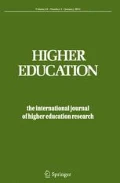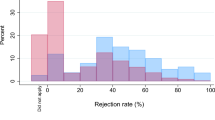Abstract
Favourable graduate employment outcomes are critical for future enrolments in higher education. Enrolments fund higher education providers and ensure a continuous supply of graduates to enhance organisational effectiveness, national productivity and global competitiveness. Recent evidence suggests the global financial crisis has softened graduate labour markets. Stakeholder concerns for graduate career prospects and the adequacy of return on investment from studying at university prompt exploration of those factors which influence graduate employment outcomes. This study tests, using logistic regression, a model of job attainment in recent Bachelor graduates of Australian higher education providers using national data gathered in 2011 (n = 28,246) and 2012 (n = 28,009). Findings indicate employer selection criteria broadly align with our understanding of what constitutes graduate employability, including technical expertise, generic skill mastery and a successfully formed graduate identity. Labour market opportunities, however, are not based on merit alone with employers favouring those graduating from prestigious universities, part-time students and whose study incorporated elements of on-campus learning. There were also noted variations by discipline, age and residency status. The study enhances our understanding of which factors influence graduate employment outcomes and discusses implications for relevant stakeholders.
Similar content being viewed by others
References
Accenture. (2013). College graduate employment survey. US: Accenture.
Allen, E., & Seaman, J. (2013). Changing course: Ten years of tracking online education. Newburyport, MA: Sloan Consortium.
Australian Association of Graduate Employers [AAGE]. (2012). 2012 AAGE employer survey. Sydney: AAGE.
Australian Bureau Statistics. (2010). Education and training experience 2009, Cat. 6278.0. Canberra: Australian Bureau of Statistics.
Bourner, T., & Millican, J. (2011). Student-community engagement and graduate employability. Widening Participation and Lifelong Learning, 13(2), 68–85.
Brennan, J., & Shah, T. (2003). Access to what? Converting educational opportunity into employment opportunity. London: CHERI.
Bridgstock, R. (2009). The graduate attributes we’ve overlooked: Enhancing graduate employability through career management skills. Higher Education Research and Development, 28(1), 31–44.
Brooks, R. (2012). Evaluating the impact of placements on employability. In Employability, enterprise and citizenship in higher education conference 2012, 27 March 2012. Manchester Metropolitan University.
Brown, P., & Hesketh, A. (2004). The mismanagement of talent. Oxford, UK: Oxford University Press.
Carroll, D., & Tani, M. (2013). Over-education of recent higher education graduates: New Australian panel evidence. Economics of Education Review, 32(1), 207–218.
Chan, D. (2009). So why ask me? Are self-report data really that bad? In C. E. Lance & R. J. Vandenberg (Eds.), Statistical and methodological myths and urban legends: Doctrine, verity and fable in the organizational and social sciences (pp. 309–335). New York: Routledge.
Coates, H., & Edwards, D. (2009). The 2008 Graduate Pathways Survey: Graduates’ education and employment outcomes five years after completion of a bachelor degree at an Australian university. Camberwell: Australian Council for Educational Research.
Coates, H., & Edwards, D. (2011). The Graduate Pathways Survey: New insights on education and employment outcomes five years after Bachelor degree completion. Higher Education Quarterly, 65(1), 74–93.
Cole, M., Feild, H., Giles, W., & Harris, S. (2009). Recruiters’ inferences of applicant personality based on résumé screening: Do paper people have a personality? Journal of Business and Psychology, 24(1), 5–18.
Confederation of British Industry [CBI]. (2011). Building for growth: Business priorities for education and skills—education and skills survey 2011. London: CBI.
Corcoran, J., Stimson, R., & Li, T. (2011). Locational patterns of new graduate employment and regional economic performance in Australia. International Journal of Foresight and Innovation Policy, 7(1/2/3), 44–55.
Dacre Pool, L., & Sewell, P. (2007). The key to employability developing a practical model of graduate employability. Education and Training, 49(4), 277–289.
Eby, L., Butts, M., & Lockwood, A. (2003). Predictors of success in the era of the boundary less career. Journal of Organizational Behavior, 24(6), 689–708.
Glover, D., Law, S., & Youngman, A. (2002). Graduateness and employability: Student perceptions of the personal outcomes of university education. Research in Post-Compulsory Education, 7(3), 293–306.
Gonyea, R. (2005). Self-reported data in institutional research: Review and recommendations. New Directions for Institutional Research, 2005(127), 73–89.
Graduate Careers Australia. (2013a). AGS 2012: Added and derived variables. Melbourne: GCA.
Graduate Careers Australia. (2013b). Beyond graduation 2012. Melbourne: GCA.
Graduate Careers Australia [GCA]. (2012a). Graduate course experience 2011. Melbourne: GCA.
Graduate Careers Australia [GCA]. (2012b). GradStats: Employment and salary outcomes of recent higher education graduates. Melbourne: GCA.
Hair, J., Black, W., Babin, B., & Anderson, R. (2010). Multivariate data analysis: A global perspective. New Jersey: Pearson Prentice-Hall.
Hillage, J., & Pollard, E. (1998). Employability: Developing a framework for policy analysis. Research Report No. 85, Institute for Employment Studies. Sudbury: DfEE Publications.
Holmes, L. (2013). Competing perspectives on graduate employability: Possession, position or process? Studies in Higher Education, 38(4), 538–554.
Jackson, D. (2013a). Business graduate employability—Where are we going wrong? Higher Education Research and Development, 32(5), 776–790.
Jackson, D. (2013b). Self-assessment of employability skill outcomes among undergraduates and alignment with academic ratings. Assessment and Evaluation in Higher Education. http://www.tandfonline.com/doi/abs/10.1080/02602938.2013.792107.
Jackson, D., & Chapman, E. (2012). Non-technical competencies in undergraduate Business degree programs: Australian and UK perspectives. Studies in Higher Education, 37(5), 541–567.
Jensen, K. (2009). Why work experience matters! Real prospects 2009 graduates’ experiences of placements, internships and work experience. Manchester: Higher Education Career Services Unit.
Knight, P., ESECT, et al. (2003). Briefings on employability 3: The contribution of LTA and other curriculum projects to student employability. York: HEA.
Krug, G., & Rebien, M. (2011). Job search via social networks: An analysis of monetary and nonmonetary returns for low-skilled unemployed. IAB, Discussion Paper No. 201123.
Kumar, A. (2007). Personal, academic and career development in higher education—SOARing to success. London, New York: Routledge, Taylor and Francis.
Lauder, H., Brown, P., Dillabough, J., & Halsey, A. (2006). Introduction: The prospects for education: Individualization, globalization, and social change. In H. Lauder, P. Brown, J.-A. Dillabough, & A. H. Halsey (Eds.), Education, globalization and social change (pp. 1–70). Oxford: Oxford University Press.
Li, I., & Miller, P. (2013). The absorption of recent graduates into the Australian labour market: Variations by university attended and field of study. Australian Economic Review, 46(1), 14–30.
Lowden, K., Hall, S., Elliot, D., & Lewin, J. (2011). Employers’ perceptions of the employability of new graduates. London: Edge Foundation.
Mason, G., Williams, G., & Cranmer, S. (2006). Employability skills initiatives in higher education: What effects do they have on graduate labour market outcomes?. London: National Institute of Social and Economic Research.
Mayston, D. (2002). Evaluating the benefits of career guidance. Derby: Centre for Guidance Studies, University of Derby.
McKeown, T., & Lindorff, M. (2011). The graduate job search process—A lesson in persistence rather than good career management? Education+. Training, 53(4), 310–320.
Nair, C., & Shah, M. (2011). Developing an effective student feedback and improvement system: Exemplars with proven success. AUQA Occasional Publications Series 113.
National Association of Colleges and Employers [NACE]. (2012). Job outlook report. Bethlehem, PA: NACE.
Nicholson, L., Putwain, D., Connors, L., & Hornby-Atkinson, P. (2013). The key to successful achievement as an undergraduate student: Confidence and realistic expectations? Studies in Higher Education, 38(2), 285–298.
Norton, A. (2012). Higher education tuition subsidies: An unnecessary public expense? The APCET Journal for Private Education, 1(2), 10–14.
Oliver, D. (2011). University student employment and expectations of the graduate labour market. Journal of Industrial Relations, 53(1), 123–131.
Oliver, B. (2013). Graduate attributes as a focus for institution-wide curriculum renewal: Innovations and challenges. Higher Education Research and Development, 32(3), 450–463.
Organisation for Economic Co-operation and Development. (2002). Rethinking human capital. Paris: OECD.
Paul, P., Pennell, M., & Lemeshow, S. (2013). Standardizing the power of the Hosmer–Lemeshow goodness of fit test in large data sets. Statistics in Medicine, 32(1), 67–80.
Pegg, A., Waldock, J., Hendy-Isaac, S., & Lawton, R. (2012). Pedagogy for employability. York: HEA.
Prentice, M., & Robinson, G. (2010). Improving student learning outcomes with service learning (pp. 1–16). Washington, DC: American Association of Community Colleges.
Purcell, K., Wilton, N., & Elias, P. (2007). Hard lessons for lifelong learners? Age and experience in the graduate labour market. Higher Education Quarterly, 61(1), 57–82.
Purcell, K., Elias, P., Atfield, G., Behle, H., Ellison, R., & Luchinskaya, D. (2013). Transitions into employment, further study and other outcomes. Warwick: Warwick Institute of Employment Research.
Ramakrishnan, K., & Yasin, N. (2012). Employment issues among Malaysian information and communication technology (ICT) graduates: A case study. African Journal of Business Management, 6(16), 5615–5621.
Riddell, S., Edward, S., Weedon, E., & Ahlgren, L. (2010). Disability, skills and employment: A review of recent statistics and literature on policy and initiatives. Manchester: Equality and Human Rights Commission.
Ross, J. (2012). $3bn hit to economy as foreign students slump. The Australian.
Roy Morgan Research. (2009). Year 12 choices: A survey of factors influencing year 12 decision-making on post-school destination, choice of university and preferred subject. Canberra: Australian Department of Education, Employment and Workplace Relations.
Schwartz, D., Bransford, J., & Sears, D. (2005). Efficiency and innovation in transfer. Stanford, CA: Stanford University.
Sitzmann, T., Ely, K., Brown, K., & Bauer, K. (2010). Self-assessment of knowledge: A cognitive learning or affective measure? Academy of Management Learning and Education, 9(2), 169–191.
Smith, J., McKnight, A., & Naylor, R. (2000). Graduate employability: Policy and performance in higher education in the UK. Economic Journal, 110(June), F383–F411.
Tabachnick, B., & Fiddell, L. (2007). Using multivariate statistics (5th ed.). Boston, MA: Pearson.
Ward, L., McAdie, T., Bravington, A., & King, N. (2012). The process of designing and analysing a qualitative study into multiple work integrated learning experiences. In 2012 Australian collaborative education network national conference (pp. 302–306).
Watts, A. (2005). Career guidance policy: An international review. Career Development Quarterly, 28(1), 1–8.
Webster, J., Castano, C., & Palmen, R. (2011). Special issue: Editorial. International Journal of Gender, Science and Technology, 3(2), 358–362.
Wilton, N. (2011). Do employability skills really matter in the UK graduate labour market? The case of business and management graduates. Work Employment Society, 25(1), 85–100.
Wilton, N. (2012). The impact of work placements on skill development and career outcomes for business and management graduates. Studies in Higher Education, 37(5), 603–620.
Author information
Authors and Affiliations
Corresponding author
Rights and permissions
About this article
Cite this article
Jackson, D. Factors influencing job attainment in recent Bachelor graduates: evidence from Australia. High Educ 68, 135–153 (2014). https://doi.org/10.1007/s10734-013-9696-7
Published:
Issue Date:
DOI: https://doi.org/10.1007/s10734-013-9696-7



